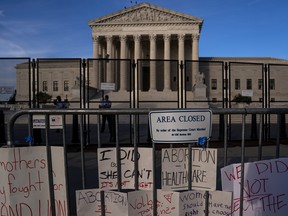Article content
What if there are no more rules?

During the financial crisis in 2008, Philip Wilson says he became a somewhat reluctant landlord.
The property market had slowed considerably so he decided to rent out, rather than sell, two properties – a flat and a house in North and West Yorkshire.
Now, the upheaval in the mortgage market means he is being forced to push up the rent for his tenants, and is considering whether he will eventually have to sell up.
“I really feel for my tenants,” the 64-year-old says. “One of them is really struggling, she pays her rent in parts when she
Stare decisis is the immutable legal rule that courts will stick to established precedent when making decisions.

What if there are no more rules?
What if there are no more laws? No more precedents, no more
Under New Jersey’s Open Public Meetings Act (OPMA), a public agency may discuss taking adverse action against a public employee in a closed (executive) meeting unless the employee being discussed exercises his or her right to have the discussion conducted in public.
In order for the employee to meaningfully exercise that right, the public agency is required to give timely notice (ie a “Rice” notice, named after the 1977 case of Rice v. Union County Regional High School Board of Education) to any employee whose rights could be adversely affected by the intended private discussion.
In today’s published (and thus
FOR IMMEDIATE RELEASE
New Jersey Basis for Open Authorities, March 2021
New Jersey’s native governments, on common, are solely 60 p.c in compliance with the New Jersey Open Public Conferences Act (OPMA), in keeping with a examine launched by the New Jersey Basis for Open Authorities (NJFOG).
The OPMA, handed into regulation in 1975, has remained comparatively unchanged over 45 years. The first function of the OPMA is to conduct authorities conferences in public, maintain a document of public conferences, and to present the general public satisfactory discover.
In what’s the first statewide examine of municipalities, native authorities and boards
Twitter is being sued by its landlord for ducking out on rent for its downtown San Francisco headquarters, where the platform reportedly went through heavy cost-cutting under new CEO Elon Musk.
The company owes $136,260 in unpaid rent, according to the lawsuit filed Thursday by Columbia Property Trust.
Twitter’s freeloading was reported early last month by the New York Times, which Musk wrote and his advisors hoped to renegotiate terms of lease agreements after mass layoffs.
The downsizing has already begun.
Twitter closed its Seattle offices, The Times reported Friday — cutting janitorial and security services. Employees were left bringing